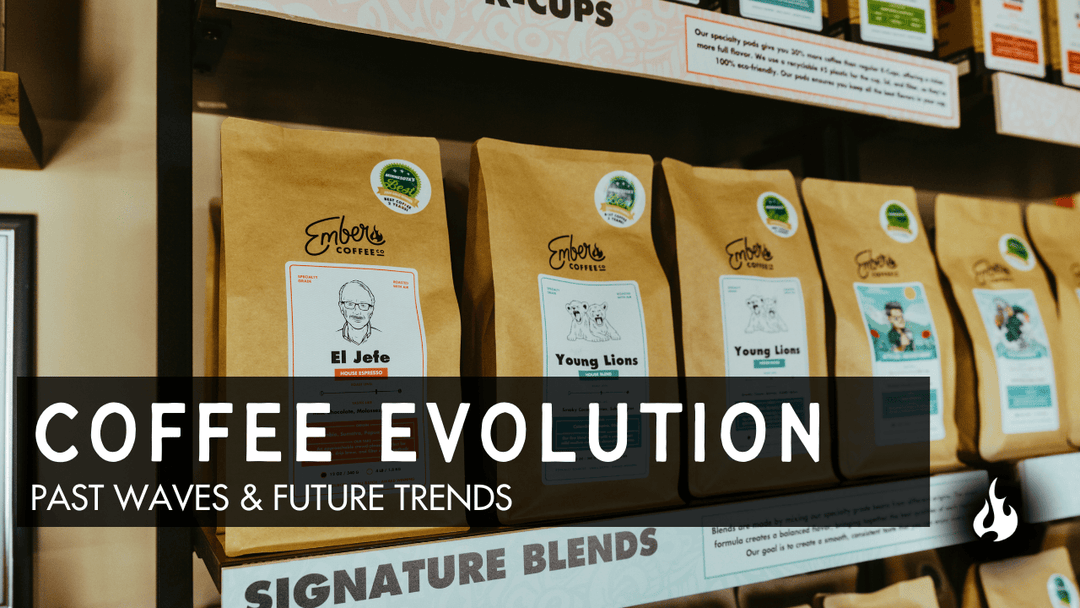Is Coffee Bad for Your Kidneys? What Science Says
Is Coffee Bad for Your Kidneys? What Science Says
Coffee lovers, take heart. If you've been wondering whether your daily ritual is helping or harming your kidney health, the research brings mostly good news. As passionate coffee roasters here at Ember Coffee, we believe understanding how coffee affects your body helps you make informed choices about what you brew and sip each day.

Coffee lovers, take heart. If you've been wondering whether your daily ritual is helping or harming your kidney health, the research brings mostly good news. As passionate coffee roasters here at Ember Coffee, we believe understanding how coffee affects your body helps you make informed choices about what you brew and sip each day.
Your kidneys work tirelessly to filter waste and excess fluid from your blood, maintaining the delicate balance your body needs to function properly. With coffee being the second most consumed beverage worldwide after water, it's natural to question how this beloved drink impacts these vital organs.
Let's explore what science tells us about coffee's relationship with kidney function, separating fact from fiction along the way.
Understanding Your Kidneys and Their Vital Work
Your kidneys are remarkable organs that process about 50 gallons of blood daily, removing toxins and excess water while maintaining proper electrolyte balance. They regulate blood pressure, produce red blood cells, and keep your body's pH levels stable.
Healthy kidney function depends on adequate hydration, proper blood flow, and minimal exposure to harmful substances. When kidneys become compromised, waste products build up in your bloodstream, leading to serious health complications.
This is why many coffee drinkers worry about their habit. But does coffee actually threaten kidney health, or could it offer protective benefits?

Coffee's Potential Kidney Benefits
Research reveals several ways coffee may actually support kidney health when consumed thoughtfully.
Antioxidant Powerhouse
Coffee contains over 1,000 bioactive compounds, including powerful antioxidants like chlorogenic acids and quinides. These compounds combat oxidative stress and inflammation throughout your body, including in your kidneys. The anti-inflammatory effects may help protect kidney tissue from damage over time.
Lower Risk of Chronic Kidney Disease
Multiple large-scale studies suggest regular coffee consumption correlates with reduced risk of chronic kidney disease (CKD). A 2014 study published in the American Journal of Kidney Diseases found that people drinking one cup of coffee daily had a 15% lower risk of developing CKD compared to non-coffee drinkers.
Heart-Kidney Connection
Your cardiovascular and kidney health are closely linked. Coffee's documented benefits for heart health - including reduced risk of heart disease and improved blood vessel function - may indirectly support kidney health by promoting better circulation and blood flow to these organs.
Protection Against Certain Kidney Stones
Interestingly, coffee consumption appears to reduce the risk of uric acid kidney stones. The beverages' compounds may help your body process uric acid more effectively, preventing crystal formation in the kidneys.
Potential Concerns: When Coffee Might Challenge Kidney Health
While coffee offers benefits, certain consumption patterns or individual circumstances can create challenges for kidney function.
Dehydration Risks
Coffee acts as a mild diuretic, increasing urine production. For most people, this effect is minimal and the body adapts quickly. However, excessive coffee consumption without adequate water intake could contribute to dehydration, potentially stressing the kidneys.
If you're drinking more than four cups daily and not maintaining proper hydration, you might be putting unnecessary strain on these hardworking organs.
Oxalate Content and Calcium Oxalate Stones
Coffee contains oxalates, compounds that can contribute to calcium oxalate kidney stone formation in susceptible individuals. These are the most common type of kidney stones, affecting people who have difficulty processing oxalates or who consume high-oxalate foods regularly.
The oxalate concern doesn't mean you should avoid coffee entirely if you're prone to stones. Rather, moderation and proper hydration become even more important.
Processing Additives and Quality Concerns
Not all coffee affects kidney health equally. Highly processed instant coffee and cheap pre-ground options often contain higher levels of acrylamides and other compounds that may stress the kidneys over time.
Additionally, many commercial coffee creamers and flavored syrups are high in phosphorus, which can be problematic for people with existing kidney issues.

Guidelines for Kidney-Friendly Coffee Consumption
Making coffee part of a kidney-healthy lifestyle involves thoughtful choices about quantity, quality, and preparation methods.
Moderate Your Intake
For most adults with healthy kidneys, consuming 1-3 cups of coffee daily appears safe and potentially beneficial. This translates to approximately 95-285 mg of caffeine, well within recommended limits.
People with existing kidney disease should consult their healthcare providers but may need to limit intake to 1-2 cups daily or about 200 mg of caffeine.
Prioritize Hydration
Balance coffee's mild diuretic effect by drinking plenty of water throughout the day. A good rule of thumb is consuming one glass of water for every cup of coffee, though your individual hydration needs may vary based on activity level, climate, and overall health.
Choose Quality Coffee
Fresh-roasted, high-quality coffee beans contain fewer processing byproducts that might stress your kidneys. At Ember Coffee, our air-roasting process creates naturally lower-acid coffee that's gentler on your digestive system and potentially easier on your kidneys.
Look for coffee that's been roasted recently and stored properly to maximize beneficial compounds while minimizing potentially harmful substances.
Mind Your Add-Ins
Skip artificial creamers high in phosphorus and synthetic additives. Instead, try natural alternatives like unsweetened oat milk, almond milk, or a small amount of organic cream. If you need sweetness, consider natural options like stevia or a small amount of raw honey.
Special Considerations for At-Risk Individuals
Certain groups should pay extra attention to their coffee consumption and kidney health relationship.
People with diabetes, high blood pressure, or existing kidney disease should work with healthcare providers to determine appropriate coffee intake levels. These conditions already stress the kidneys, making mindful beverage choices even more important.
Pregnant women should limit coffee consumption not only for fetal development but also because pregnancy increases kidney workload.
Older adults may process caffeine differently and should monitor how coffee affects their hydration status and overall kidney function.
The Minnesota Coffee Connection: Why Quality Matters
Here in Minnesota, we understand the importance of starting each day with exceptional coffee. As a small-batch coffee roaster, Ember Coffee focuses on creating products that taste incredible while supporting your health goals.
Our air-roasting process produces coffee with naturally lower acidity levels, which may be easier on your digestive system and kidneys. We source high-quality beans and roast them in small batches to ensure freshness and minimize the processing byproducts found in mass-produced coffee.
When you choose local Minnesota coffee roasters like Ember Coffee, you're not just supporting your community - you're making a choice for quality that your kidneys will appreciate.

Making Coffee Work for Your Kidney Health
Coffee doesn't have to be an all-or-nothing proposition when it comes to kidney health. The key lies in making informed choices about quality, quantity, and consumption patterns.
For most people, moderate coffee consumption as part of a balanced, well-hydrated lifestyle supports rather than threatens kidney function. The antioxidants, anti-inflammatory compounds, and other beneficial substances in quality coffee may even offer protective benefits.
Focus on choosing fresh-roasted, high-quality coffee from trusted sources like Minnesota's local roasters. Stay properly hydrated, listen to your body, and consult healthcare providers if you have existing kidney concerns or risk factors.
Your daily coffee ritual can remain a source of pleasure and potentially even health benefits when approached with knowledge and moderation. At Ember Coffee, we're committed to providing the quality and transparency you need to make confident choices about your coffee consumption.
Ready to explore kidney-friendly, expertly roasted coffee? Discover how our small-batch, air-roasted beans can elevate your daily routine while supporting your health goals.







